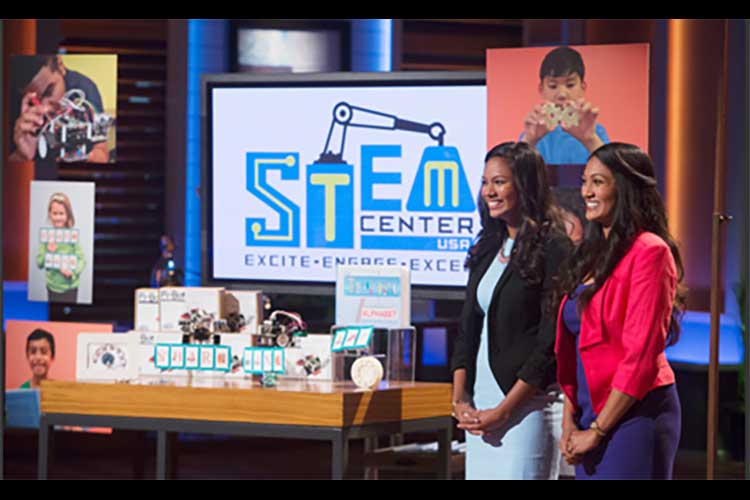Pi-Bot inventors score $200,000 deal on ‘Shark Tank’
Berkeley senior and ASUC Executive Vice President Lavanya Jawaharlal and her sister Melissa, both mechanical engineers, walked away from TV’s investment reality show “Shark Tank” with a $200,000 deal that they will put toward taking their STEM robotics education concept nationwide.

November 2, 2015
Berkeley senior and ASUC Executive Vice President Lavanya Jawaharlal and her sister Melissa, both mechanical engineers, walked away from TV’s investment reality show “Shark Tank” with a $200,000 deal that they will put toward taking their STEM robotics education concept nationwide.
The two, who founded STEM Center USA to use robotics and other hands-on creative methods to teach science, technology, engineering and math to more diverse students, inspired an all-out war between two of the high-profile investors on the ABC show’s panel of “sharks.” Their pitch for funding, which aired Friday, ended up pitting veteran shark Lori Greiner, a retail giant on the QVC channel, against show newbie Chris Sacca, the Silicon Valley billionaire.
 “So, two sisters who are mech engineers have built orbiting satellites and commercialized their own robot? An investor’s dream,” gushed Sacca on Twitter. He told Business Insider that they were “some of the best pitchers I’ve seen anywhere.”
“So, two sisters who are mech engineers have built orbiting satellites and commercialized their own robot? An investor’s dream,” gushed Sacca on Twitter. He told Business Insider that they were “some of the best pitchers I’ve seen anywhere.”
But in the end, Greiner offered the better deal, Lavanya Jawaharlal said this morning.
“We walked in there wanting a valuation of $1 million, and that’s what she gave us. She had the best offer, and she also has the expertise we need as far as products and entrepreneurial background,” Jawaharlal told Berkeley News.
For her $200,000 investment, Greiner will get a 20 percent share of the company. Greiner originally wanted to team up with Sacca, but he refused. But she topped his offer of $200,000 for 22.5 percent. The sisters went with Greiner.
Jawaharlal says that most of the show’s pitching actually goes on behind the scenes. Pitch sessions can take 90 minutes, Sacca said on Twitter; only six minutes of the STEM Center’s pitch was shown.
She had to sit on the news “quite a while” after the show was filmed, she says; the network won’t let her say how long. “All my friends have been asking!”
But when it came time for the episode to air, STEM Center USA threw a viewing party for 60 to 70 of its students, their parents and friends, with champagne, soda and lots of pizza.
The STEM Center works with kids of all ages designing, building and programming robots. It has already outgrown its original space, and the sisters have launched school programs, too. They also sell their own product line, including the affordable Pi-Bot robot kit, The Technical Alphabet and the Fiat Lux Wearable Electronics Kit, which went up on Kickstarter Friday.
The new investment money will let them start franchising paperwork and documentation, Jawaharlal says.
“Our goal is to expand to cities countrywide,” she says.
The cash infusion also means more work, and Lavanya still has one semester to go to complete her degree. She’ll take her final two courses this spring, stacking them on Mondays and Wednesdays so she can devote Thursday through Sunday to STEM Center work. She plans to work full-time for the company after that.
“I’m itching to graduate,” she says, “but I’m also going to be sad to leave Berkeley.”